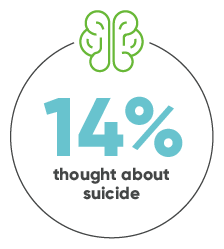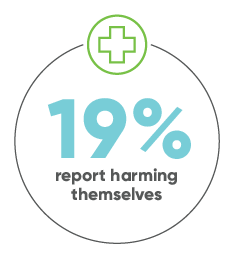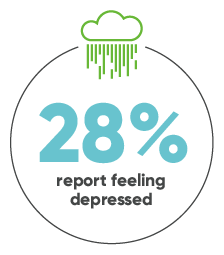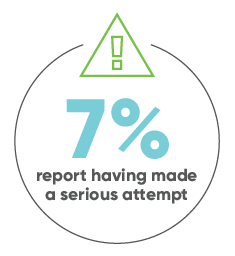Young people experience a wide range of emotions, sometimes in a surprisingly short period of time. Parents and caregivers want to support their children and help them deal with their feelings and emotions. As a parent, you can teach and model healthy habits for mental health, just as you would with physical health. Taking care of your own mental health and talking about it openly are some ways to model healthy practices.
Don’t be afraid to have a conversation with your child about mental health. Listen intently and without judgment, validate and support their feelings, and ask open-ended questions. If you are concerned about your child’s behavior and think something may be wrong, knowing how to have a conversation about it with your child is important.
Mental health is as much of our overall well-being as physical health. Stressors can cause a need for additional support or professional help.
Individuals who develop mental health conditions, such as anxiety or depression, frequently experience their first symptoms in childhood or adolescence. As with all health conditions, early identification and treatment can lead to better outcomes.


As shown by the Union County Youth Risk Behavior Survey:


Source: 2021 Union County Parent Perception Survey
Ways to Support Your Child’s Mental Wellbeing
FEELINGS
Listen first, reflect what you heard, and ask for clarification if needed. Help them cope by being supportive, respectful, and caring.
ROUTINES
Daily chores, activities and sleep schedules help establish predictable routines and healthy lifestyles.
CHANGES
Monitor your child’s friends, activities, interests, and academics. If changes appear to be problematic, and it affects their wellbeing, seek specialized help.
What’s Being Discussed in Schools?

Each school system in Union County has access to a School Navigator – a licensed mental health professional that provides school-based mental health services, which include referrals, intervention, and ongoing case management. If you would like to learn more about what specific programs and practices are employed by your child’s school district to support mental wellness, please follow the appropriate links below by clicking on the logos below. Hear more about this program on at this podcast link
Schools employ a number of strategies and evidence-based best practices in order to promote mental wellness. Programs are designed to enhance social-emotional development, increase a sense of belonging within the school community, and bring out the best in each student.
Typically, these practices come in the form of preventative programs, interventions, and community partnerships. More specifically, in Union County, your child’s school may be implementing prevention programs such as:
- PAX Good Behavior Game
- PAX Tools
- DBT Skills in Schools (DBT STEPS-A)
- Signs of Suicide
- Lifelines and/or Gatekeepers
- Botvin’s Lifeskills
Further, interventions delivered by school counselors, school psychologists, and area mental health providers may include:
- Second Step
- The Zones of Regulation
- And/or regular check-ins and coaching with a school counselor or psychologist
Screen Time & Kids
DO YOU HAVE A "SCREENAGER"?
“Screen time” is a term used for activities done in front of a screen, such as watching TV, working on a computer, or playing video games. Screen time is a sedentary activity, meaning you are being physically inactive while sitting down. Very little energy is used during screen time.
Most American children spend about 3 hours a day watching TV. Added together, all types of screen time can total 5 to 7 hours a day.
Too much screen time can:
- Make it hard for your child to sleep at night
- Raise your child’s risk for attention problems, anxiety, and depression
- Raise your child’s risk of gaining too much weight (obesity)
Learn more about monitoring screen time here.

Is This Just a Stage?

In general, if a child’s behavior persists for a few weeks or longer, causes distress for the child or the child’s family, and interferes with functioning at school, at home, or with friends, then consider seeking help. If a child’s behavior is unsafe, or if a child talks about wanting to hurt him or herself or someone else, then seek help immediately. (NIH Children and Mental Health Is This Just a Stage?)
FOUR POINTS TO REMEMBER:
- Always seek immediate help if a child engages in unsafe behavior or talks about wanting to hurt him or herself or someone else.
- Seek help when a child’s behavior or emotional difficulties last for more than a few weeks and are causing problems at school, at home, or with friends.
- A thorough evaluation can help determine if treatment is necessary, and which treatments may be most effective.
- Early treatment can help address a child’s current difficulties and can also help prevent more serious problems in the future.
Suicide Warnings vs. Risk Factors
WARNING SIGNS
What parents can look for:
- Feeling hopeless or worthless
- Unexplained anger or aggression
- Loss of interest in activities or hobbies
- Significant changes in sleep or appetite
- Loss of concentration or energy
- Risky behavior
- Isolation
- Social media posts, drawings or statements that reference dying
RISK FACTORS
What parents should consider:
- Previous suicide attempt
- Loss of a significant relationship
- Death of a loved one (especially to suicide)
- Unwanted move
- LGBTQ+
- A humiliating or highly embarrassing event
What to Do if Your Child is Considering Suicide
HERE'S WHAT YOU CAN DO
- Ask your child if he/she has ever thought about suicide. Don’t be afraid to use the word “suicide.” Start the conversation like this: “I’ve noticed that you don’t seem like yourself lately. I’m worried about you. Are you thinking about suicide?”
- Continue talking to your child or loved one gently asking if he/she has ever thought about how they would complete suicide. You are gauging their intent.
- Reach out for help.




